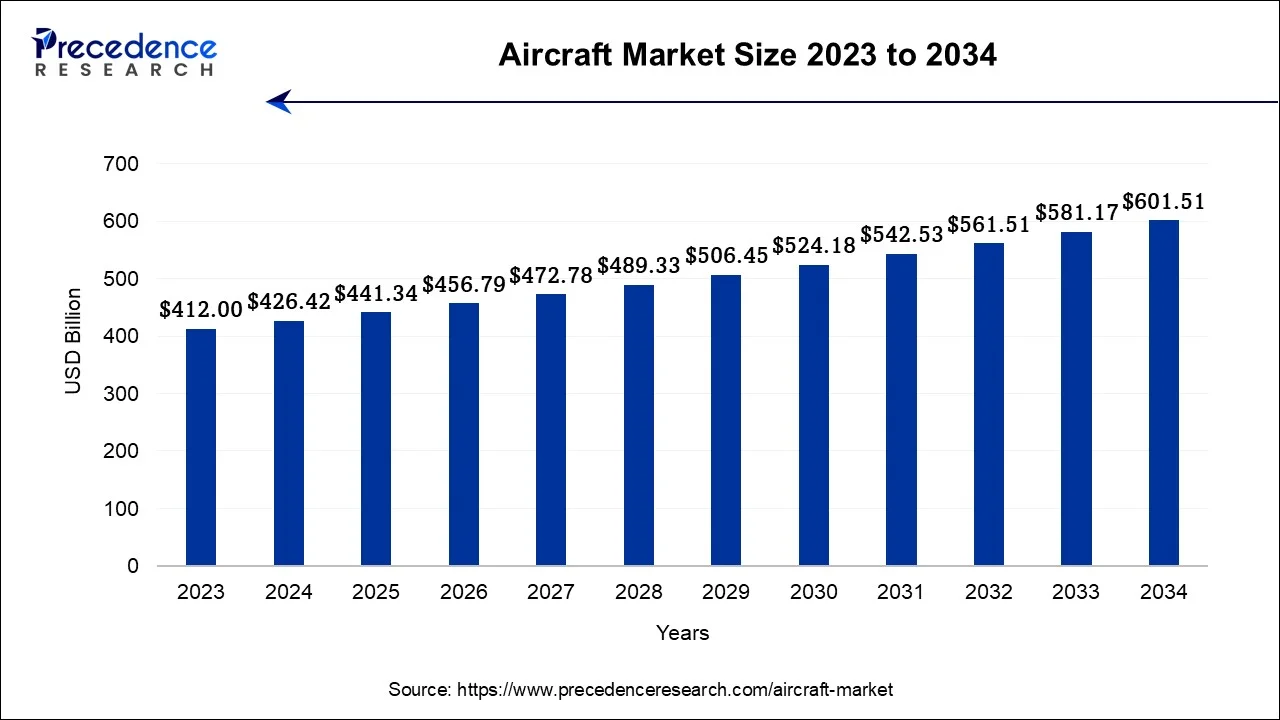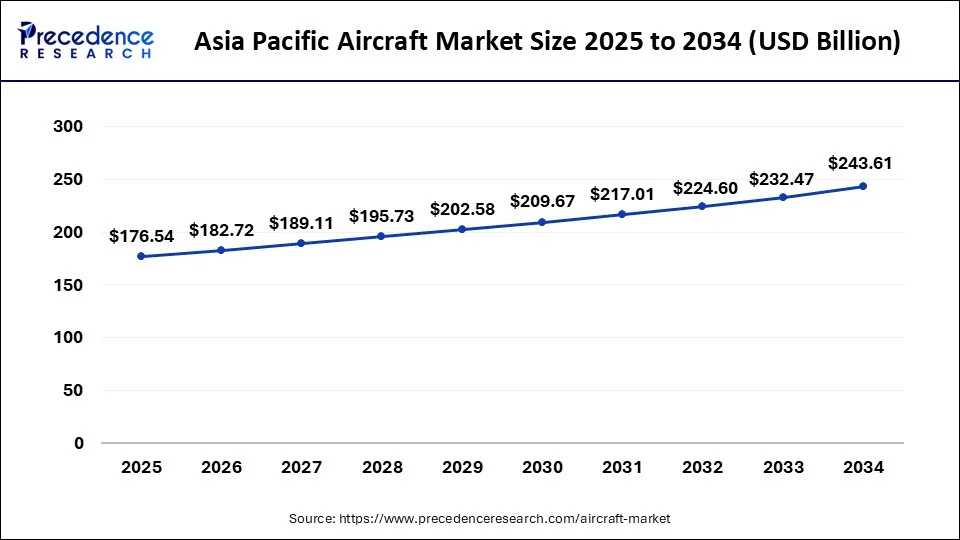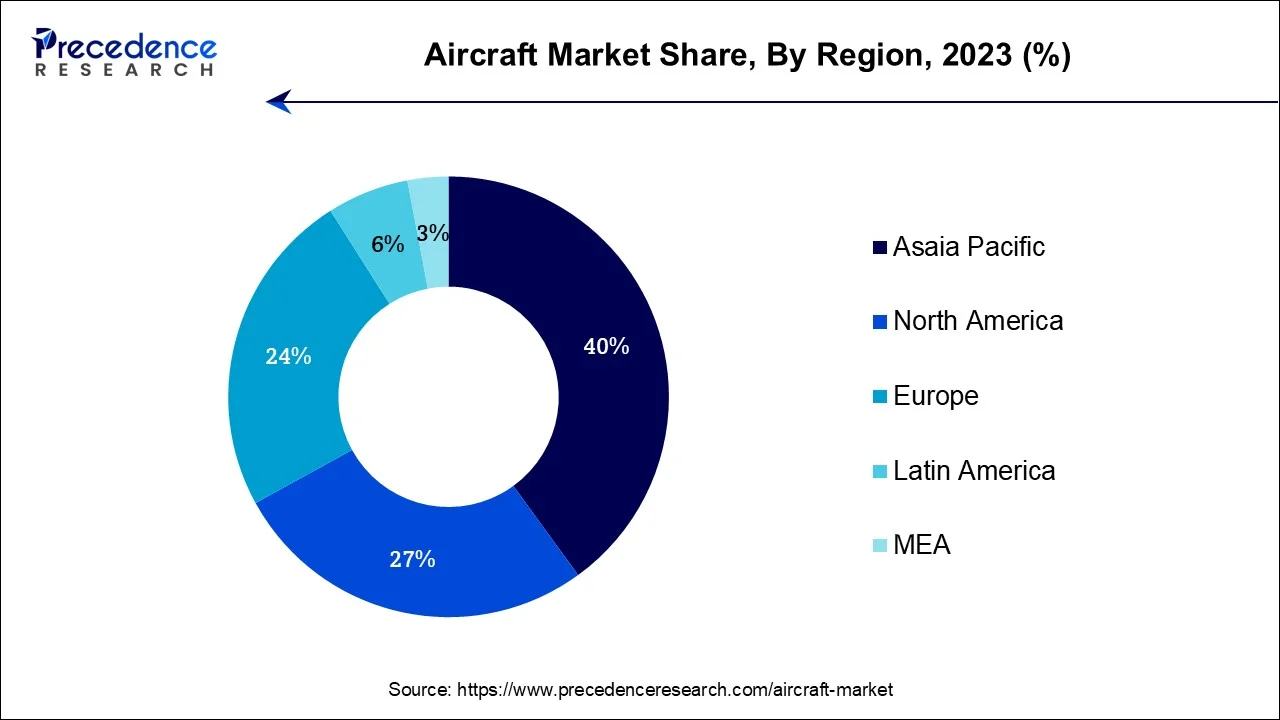Aircraft Market Size and Forecast 2025 to 2034
The global aircraft market size was estimated at USD 426.42 billion in 2024, and is anticipated to hit around USD 441.34 billion by 2025, and is projected to hit around USD 601.51 billion by 2034, growing at a CAGR of 3.50% during the forecast period 2025 to 2034.

Aircraft Market Key Takeaways
- In terms of revenue, the market is valued at $441.34 billion in 2025.
- It is projected to reach $601.51 billion by 2034.
- The market is expected to grow at a CAGR of 3.50% from 2025 to 2034.
- Asia Pacific dominated the market with the largest market share of 40% in 2024.
- North America is expected to witness significant CAGR during the forecast period.
- By Type, the commercial segment dominated the global market in 2024.
- By Size, the narrow-body segment dominated the market with the highest market size in 2024.
- By Size, the wide-body segment is expected to witness a significant rate of growth during the forecast period.
Asia Pacific Aircraft Market Size and Growth 2025 to 2034
The Asia Pacific aircraft market size is exhibited at USD 176.54 billion in 2025 and is estimated to reach around USD 243.61 billion by 2034, expanding at a CAGR of 3.62% from 2025 to 2034.

Asia Pacific dominated the aircraft market in 2024, the region is expected to sustain growth at a robust pace throughout the forecast period. The overall increasing rate of air travel among the population is promoting the market's growth in Asia Pacific. Emerging economies like India, China, and Japan are expected to contribute to the acceleration of the aircraft market in upcoming years. Moreover, the market in Asia Pacific is expected to grow due to the rising disposable income in the population and rising demand for faster commute and transportation. In addition, governments are continuously seeking ways to get faster transportation methods for goods that contribute to the nations' economies. Thus, all these elements promote the market's growth in Asia Pacific.
- Asia Pacific airlines increases traffic by 378.7% in February 2023 as compared to February 2022. The capacity of the load increased is the second highest among all the regions, the capacity rose 176.4%.
- India led the domestic passenger market in the passenger load factor (PLF) as compared to the domestic passenger market of the nations such as the United States and China. India led the domestic passenger market which is measured by PLF while achieving PLF of 81.6% in February 2023, 85.2% in January 2023, 88.9% in December 2022, and 87.9% in November in 2022.

North America is expected to witness significant growth in the market during the forecast period. The growth of the market in the region is expected to be accelerated due to the growing air defense of the nations such as the United States and Canada, the overall increased demand for aircraft and other associated services from the military and defense sector promotes the market's expansion. In North America the United States holds the largest aviation market. The Unites States is home for the top ten major market players of the aircraft market. Technological innovations by the country's top players create a significant potential for the market for the predicted period.
- In the recent data reports, it is predicted that the number of for-hire carrier aircraft has increased in the United States reaching at 6,870 in 2022.
Market Overview
The global aircraft market refers to the industry involved in the manufacturing, buying and selling of aircraft. Airplanes, helicopters and drones along with other flying vehicles are included in the industry. The market encompasses sectors such as commercial aviation, military aviation and general aviation. The aircraft industry is one of the commercially expanding industries. The aircraft industry is categorized into commercial, defense, and general aviation. There are some of the main components which are in the aircraft such as wings, fuselage, power plant, tail or empennage, and landing gear or undercarriage.
Faster transportation and luxurious transportation have been offered by the aircraft industry. Rising demand for general aviation for internal defense and for emergency healthcare services promotes the market's growth. driving the growth of the market. Moreover, key players in the market are focusing on the adoption of technological advancements, the element is expected to accelerate the market's expansion in the upcoming years.
- In recent studies it is shown that as of May 2023, Delta Airlines was the most valuable airline worldwide. Delta Airlines has a market value of approximately $22 billion. The airline is an active member of SkyTeam Airline Alliance, with the headquarters situated at the Hartsfield-Jackson Atlanta International Airport.
- Southwest Airlines was ranked the second most valuable airline with a market value of $ 17.7 billion.
- It is shown that global air traffic has increased by 22% as compared to previous years. The annual demand for air passengers was predicted to increase by 69.4% in 2022 and by 21% in 2023.
- The Airport Authority of India targeted the expenses of $12.08 billion for the development of Indian airports.
- Post pandemic when the travel restrictions were taken down there is immersive hike in the air transportation by passengers. Passenger traffic is increased from 41.7% of 2019 volume in 2021 to 68.5% in 2022.
Key Factors Influencing Future Market Trends
- Increasing use of Unmanned Aerial Systems (UAS): By using AI for navigation, UAS will be able to work together in large groups, review real-time data, and complete hard tasks on their own. Versatile drones will be used by the military for fighting, electronic strikes, and carrying supplies.
- Electrification and Hybrid Propulsion: With the aim of energy efficiency and reduced noise, many militaries are adopting hybrid-electric propulsion. Because of these technologies, aircraft will use less fuel, operate at lower costs, and be less noticeable and less noisy.
- Artificial Intelligence and Data Fusion Integration: AI assists in managing risks, optimizing relevant objectives, and aiding with robotics decisions. Data integration from multiple sensors and systems will enable enhanced data fusion, which will provide operators or pilots with real-time situational awareness.
Aircraft Market Growth Factors
- The aircraft are generally referred to as an airline, airplane, or plane. The aircraft come in several shapes or forms like gliders, balloons, airplanes, and helicopters. The continuous development in technology for the development of the aircraft industry is driving the growth of the aircraft market. Shifts in living standards and rising disposable income in the population are driving the demand for air transportation.
- Governments in several countries are focused on improving the infrastructure of aviation industry, this element brings a potential factor for the market.
- From past several years, it has been noticed that general aviation such as helicopters, cargo, private jets are used by the hospitals, travel agencies and celebrities for general use, this factor is also impacting the growth of the aircraft market.
- The pharmaceutical industry is highly contributing to the growth of the aircraft market by transporting medical transportation like medicines, patients, etc. aircraft are playing an important role in emergency transportation which is positively impacting the overall expansion of the market.
Market Scope
| Report Coverage | Details |
| Market Size by 2034 | USD 601.51 Billion |
| Market Size in 2025 | USD 441.34 Billion |
| Market Size in 2024 | USD 426.42 Billion |
| Growth Rate from 2025 to 2034 | CAGR of 3.50% |
| Largest Market | Asia Pacific |
| Base Year | 2024 |
| Forecast Period | 2025 to 2034 |
| Segments Covered | Type, Size, and Regions |
| Regions Covered | North America, Europe, Asia-Pacific, Latin America, and Middle East & Africa |
Market Dynamics
Drivers
Faster and high-speed commute offered by aircraft
The only form of freight that can cover great distances quickly is air as compared to other forms of transportation. This element makes the aircraft model the best option for clients who need to export a product urgently or whose freight requires exceptional standards of protection or acclimatization. Since it is the quickest means of transportation, it is excellent for long-distance cargo shipping. Convenient, dependable, and quick transportation services are provided by air travel. It is regarded as the most affordable method of shipping goods internationally. Moreover, as businesses and people seek a regular, practical, trustworthy, and quick service for transportation, the market for aircraft and other associated services is expected to be accelerated.
Restraint
Cost and efficiency of the fuel
Cost of the fuel is one of the major restraining factors of the aircraft industry. The continuously fluctuating rates of fuel across the globe directly impact on the financial portfolio of the industry. The increase in the fuel of aircraft is directly impacting the financial portfolio of the aircraft industry. Such varying expenses can lead to decreased operations and reduced adoption of aircraft, especially in economically weaker countries. Thus, the factor is observed to restrain the market's growth.
Opportunity
Electrification of aircraft
There are several different types of aircraft that have been electrified recently, either totally or partially. There are various forms of electrification, such as transforming totally to an electric form of aircraft or in a hybrid way. The idea of electrification makes use of electric power for all non-propulsive systems in order to increase the effectiveness of present operations or systems or decrease the workload placed on the engine through aircraft or operational modification. Examples include making the most of the available ground space, using crewed electric tugs or pilot-controlled, guidable tugs for low-speed taxis, and using on-vehicle wheel motors. The advantages of electrification are observed to increase the emphasis on electrification by manufacturers. This advancement is expected to offer the potential for the market to expand.
Type Insights
The commercial aircraft segment dominated the global aircraft market in 2024. The commercial aircraft segment is further divided into passenger aircraft and freighter. The increasing population and rising demand for faster commutes in the population is anticipated to drive the growth of the commercial segment. Rising production of commercial aircraft such as Boeing and Airbus due to the rising passenger demand is observed to be another growth factor for the segment.
The military aircraft segment is expected to grow at a significant rate during the forecast period. For the betterment of defense services, military and defense sectors of multiple countries are focused on adoption of advanced and stronger aircraft. The military aircraft segment is sub-divided into combat aircraft and non-combat aircraft. The growing demand for combat aircraft for the strong defense service and the technological advancement in the combat aircraft are driving the growth of the military aircraft segment.
Size Insights
The narrow-body aircraft segment led the market with dominating share in 2024. The dominance of the segment in the market is attributed to its size and substantial preference in the commercial aviation industry. The simple structure of manufacturing and production for narrow-body aircraft promotes the adoption of such aircraft. Narrow-body aircraft are slightly smaller, have lesser capacity of passenger and have one aisle in the aircraft. The rising rate of adoption for narrow body aircraft can be attributed to the rising demand for domestic transportation for short distances.
The wide-body aircraft segment is expected to grow significantly throughout the forecast period. The rising utilization of wide-body aircraft for international flights and long-distance travel promotes the segment's growth. The wide-body aircraft has multiple aisle and a larger capacity for passengers.
Recent Developments
- In April 2025, Dynamatic Technologies Limited, an Indian aerostructure manufacturer, and Deutsche Aircraft, a German regional aircraft OEM for sustainable aviation, jointly inaugurated the rear fuselage assembly line for the 40-seater D328eco turboprop aircraft at Dynamatic's advanced aerospace facility located outside Bangalore.
- In May 2025, China National Aero-Technology Import & Export Corporation (CATIC) showcased its standalone weapon fire control system (SWFCS) at the 2025 Langkawi International Maritime and Aerospace (LIMA) Exhibition, which was held from May 19 to May 24 in Malaysia. The system, which is also known as WZHK-1 by China, is designed to enable foreign aircraft platforms to fire Chinese missiles and bombs.
- In October 2024, Prime Minister Narendra Modi inaugurated the TATA Aircraft Complex to produce C-295 aircraft with his Spanish counterpart, Pedro Sanchez, in Vadodara, Gujarat. This deal is for 56 aircraft against the C-295 program, with 16 of these being delivered directly from the aircraft manufacturer Airbus from Spain, with the remaining 40 to be manufactured at the Vadodara facility--TATA's first private sector Final Assembly Line (FAL) for military aircraft in India.
- In September 2023, Air-France KLM had been done a revolutionary order of 50 Airbus A 350. The group of orders will cover aircraft A350-1000 and Airbus A350-900 and with the 40 additional aircraft purchased, the delivery of the first aircraft is expected between 2026 to 2030.
- In September 2023, the latest Praetor full-flight simulator was launched by Embraer and FlightSafety International in Orlando, Florida in Europe by 2024. The Praetor 500 to 600 is one of the most technically advanced aircraft in its categories according to the Embraer, while simulator is FAA-certified.
- In September 2023, after the mysterious disappearance of F-35 stealth fighter jets on South Carolina, the U.S. officially launched the probe. The F-35 fighter jet was one of the most powerful and expensive stealth fighter jet of the U.S. military forces. The jet almost takes 30 years to develop and can fly for long hours on autopilot.
Aircraft Market Companies
- The Boeing Company
- Airbus SE
- Lockheed Martin Corporation
- Textron Inc.
- Embraer S.A.
Segments Covered in the Report
By Type
- Commercial Aircraft
- Passenger Aircraft
- Freighter
- Military Aircraft
- Combat Aircraft
- Non-Combat Aircraft
By Size
- Narrow Body Aircraft
- Wide Body Aircraft
By Region
- North America
- Europe
- Asia-Pacific
- Latin America
- Middle East and Africa
 Get a Sample
Get a Sample
 Table Of Content
Table Of Content